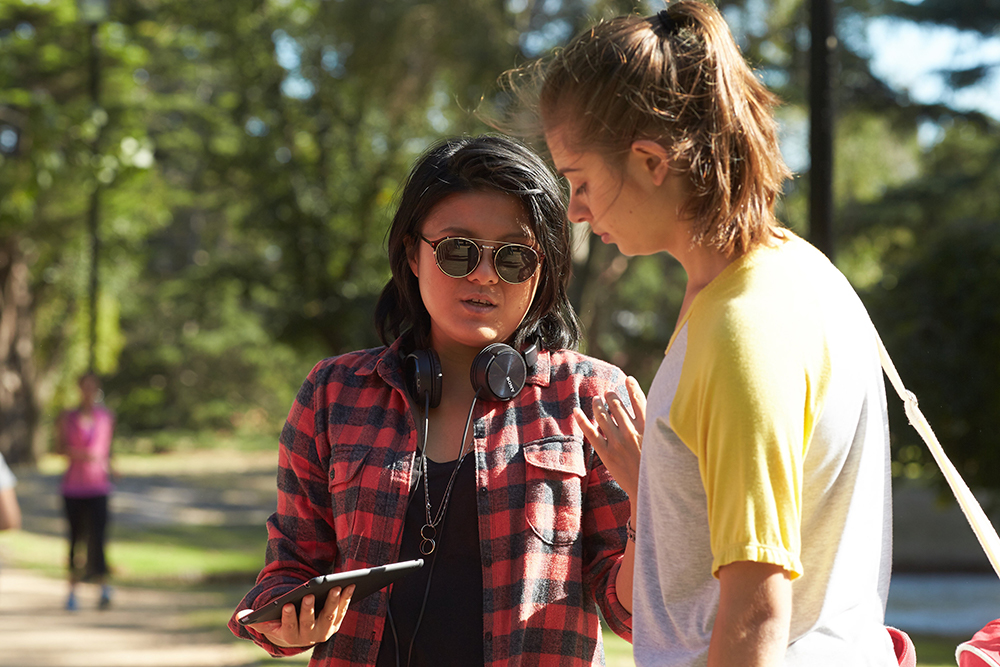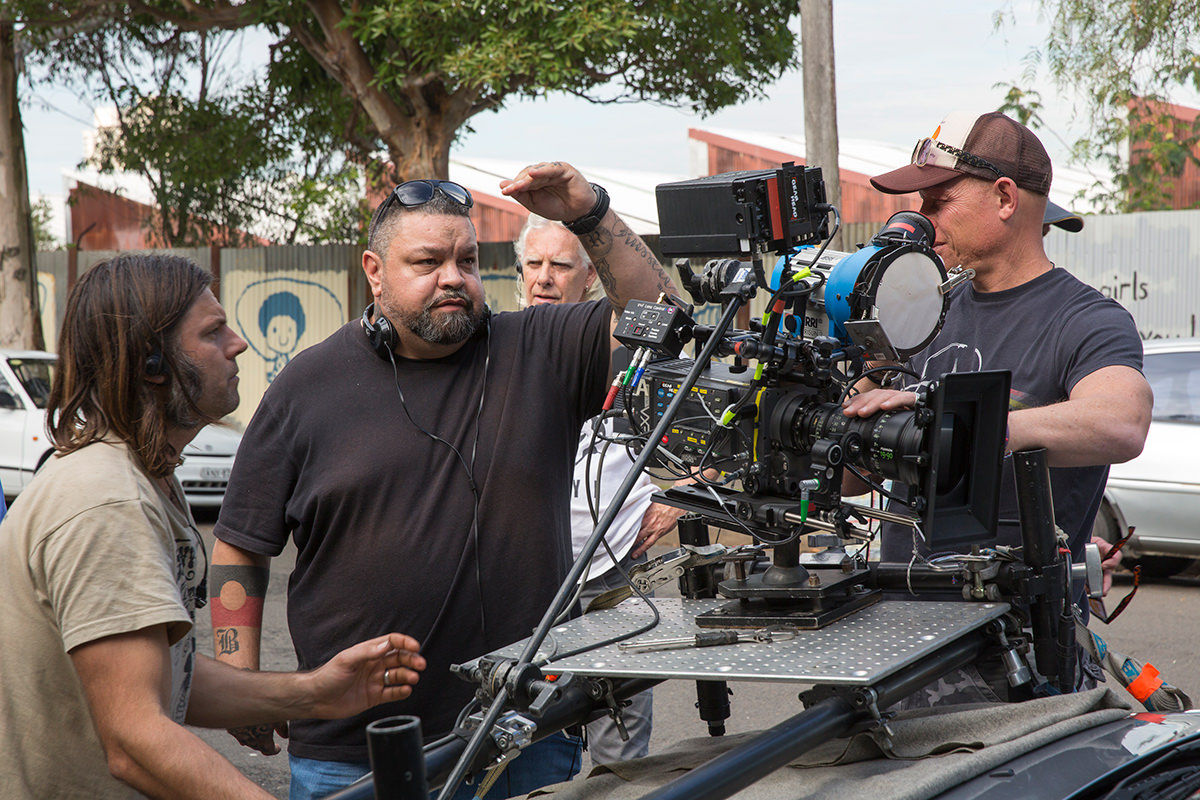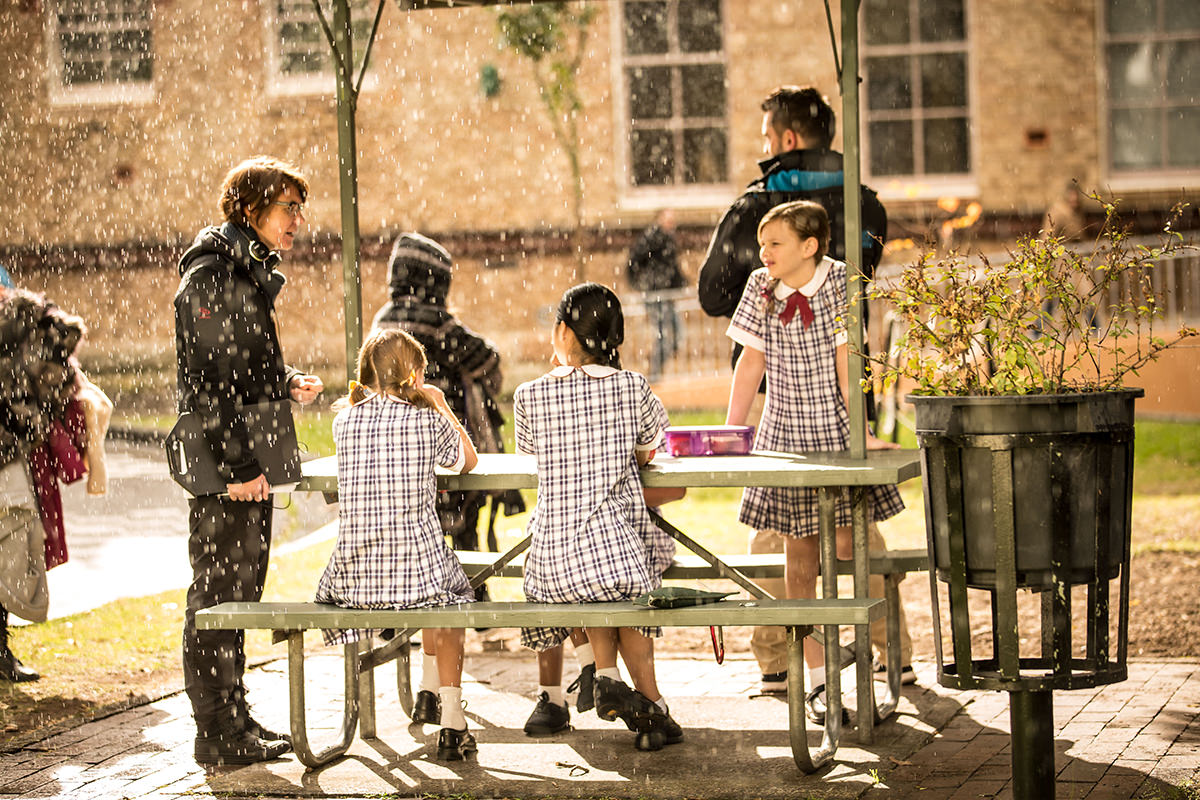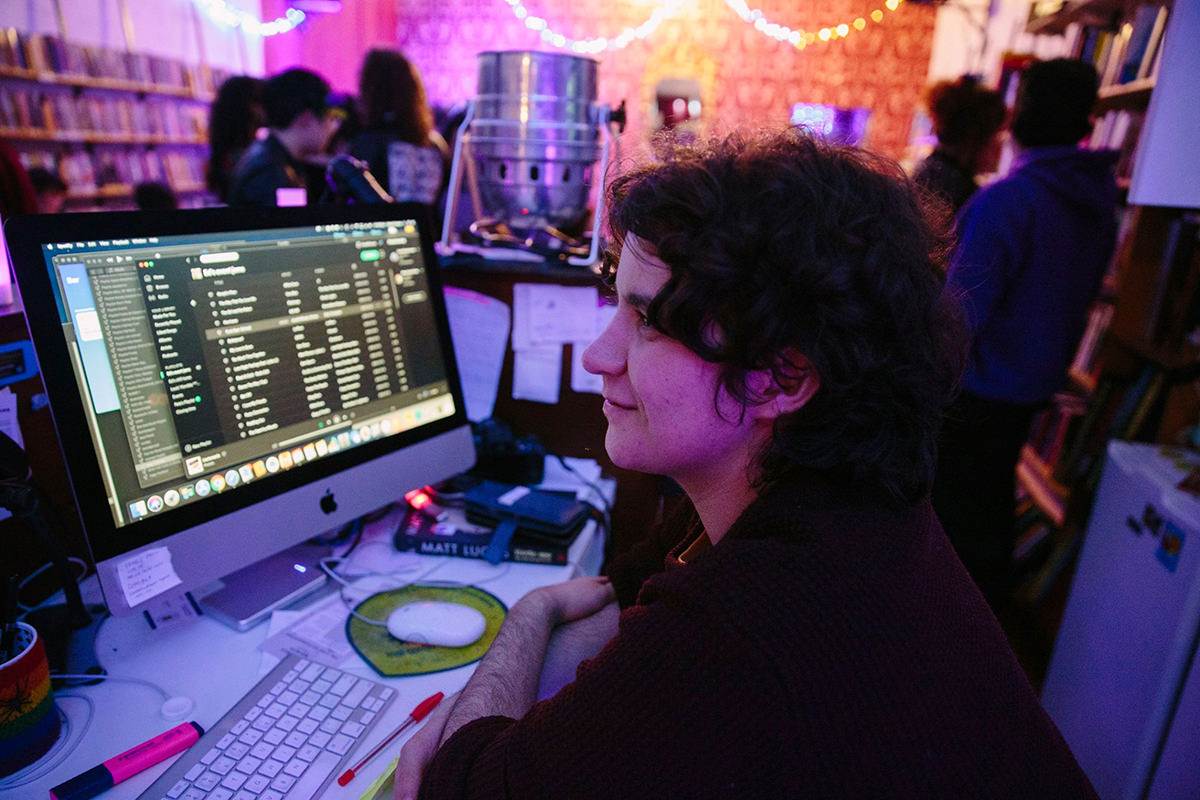For Holding the Man (2015) writer Tommy Murphy, his pathway to the silver screen came via the stage and his multiple award-winning theatre adaptation of Tim Conigrave’s beloved memoir of love in the face of the HIV/AIDS crisis. It travelled the world after debuting at Sydney’s Griffin Theatre Company in 2006. Murphy was tapped to adapt the film version which debuted in 2015.
Like Thomas, he wrote what he knew, penning his first play, For God, Queen and Country, at 16. It was a coming-out story set in regional Australia that triggered his own coming out, he recalls. “I guess I was doing that intuitively.”
Murphy has always sought to centre the queer experience in his writing. “I know I can tell queer stories with insight and understanding,” he says. “I think a queer perspective is also the opportunity to bring either a disruptive or camp way of viewing the world. And that's something I would like to do more of. I have found that opportunity much easier in theatre.”
Tommy Murphy
Directed by Neil Armfield, the journey from stage to cinema took eight years.
“It wasn’t an easy pathway at all, but that’s just the reality of making a film,” Murphy notes. “It’s a very challenging landscape with limited funding. And it’s a landscape that’s shifting, and people are guessing. Because of those challenges, that can promote conservatism, about both content and form.”
Murphy hopes that more scope will be given for LGBTQI+ stories that challenge viewers with the shock of the new.
Since its local debut, Holding the Man was picked up by Netflix for global distribution, taking a seminal Australian text worldwide once more. Murphy wonders if there’s more scope to tell these stories internationally. “Is there something squeamish about gay content or a queer perspective, and is that particular to Australia?”
“I don’t think you could say it’s true worldwide, I look at Ryan Murphy’s The Assassination of Gianni Versace, which was both such a radical, shattered story structure that I admired a lot, but also challenging that it set the story from the perspective of the perpetrator, with a queer villain. I found it so compelling and fresh, with something heartfelt and well-observed to say about the psychological framework of homophobia that also dared to populate the screen with many, varied gay characters.”
DIVERSITY WITHIN THE RAINBOW
The LGBTQI+ community form the iconic rainbow flag together, but on Australian screens only parts of the rainbow have been visible.
Fadia Abboud, the creator of web series I Luv U But (2012), was frustrated by the dearth of Arab migrant stories on Australian screens. When they did appear, they were usually hyper-masculine movies like 2009 double-dip of Cedar Boys and The Combination.
“Here Come the Habibs! (2016-17) hadn't happened yet, so there was nothing comic,” she recalls. “Being the child of a migrant makes you live your life in a particular way, and those stories can be told in the extremities. I understood the need to hide. To hide having a boyfriend or a girlfriend, having sex before marriage, or even broaching moving out of home.”
Queer identities, in particular, are socially difficult for Arab-Australian families, with many of Abboud's queer friends closeted. That forms the basis of I Luv U But’s short, sharp, deliriously funny episodes. Co-written with Western Sydney author Peter Polites in season two, it stars Abbey Aziz and George El Hindi as out friends who get married to cover up their same-sex love lives, with all the inherent comic drama that entails. There's also a nice nod to Ana Kokkinos' classic Head On in the casting of Paul Capsis as a receptionist in a sexual health clinic.
“I called his agent, he saw the show and said yes straight away,” Abboud recalls. Other casting choices proved more difficult, with challenges securing Arab-Australian actors to play queer characters, or even the parents of out roles. Her early short In the Ladies Lounge (2007) is unavailable for viewing after winning awards at the Mardi Gras Film Festival, because of the actors' sensitivities.
Head On was a huge influence on Abboud. “That was such an important film, one of the best Australian films and one of the strongest migrants stories, alongside Looking for Alibrandi (2000). It just said so much in a really stylish way. So intense, full-on and hot.”
Having gone on to direct episodes of Les Norton (2019) and Here Come the Habibs! (2017), Abboud also documented the true story of Sydney +queer Arab dance party Club Arak (2018) for ABC Love Bites. She suggests the LGBTQI+ migrant – and specifically Arab-Australian, experience – is inherently interesting, with Abboud working behind the scenes on both a TV series and a film concept further exploring that territory.
While short form content offers a low-risk way in, Abboud's heartened by the larger mainstream audiences opened up by a coming out storyline involving a young Arabic man on ABC soap opera The Heights. Progress may be slow, but she's positive about the opportunity for louder, prouder voices in Australia.
“I just hope I get to make one that gets underneath the characters, beyond coming out,” she says. “One thing leads to another, but it can be very slow in between. Securing actors and producers, then finding diverse directors, can help tell that story.”
 Corrie Chen on the set of Mustangs FC with Emmanuelle Mattana
Corrie Chen on the set of Mustangs FC with Emmanuelle Mattana
Taiwanese-Australian writer/director Corrie Chen (Homecoming Queens, Mustangs FC, Five Bedrooms) first encountered a queer storyline in Ang Lee film The Wedding Banquet (1993).
“Funnily enough, in my teenage years I loved stuff about gay men, so I was obsessed with Queer as Folk and Brokeback Mountain. I completely rejected what little lesbian storytelling was available because I was very closeted at the time. But watching gay men gave me permission to explore the concept of same-sex attraction."
Discovering Tony Ayres’s documentary short China Dolls (1992) while at film school had a profound impact. “It was the first time I had considered my identity within queer culture. I think that was one of the reasons why I didn’t embrace lesbian stories on screen, because, unfortunately, none of them looked like me. Even now, they remain largely white.”
Visibility is a huge part of coming to terms with your own identity, something further complicated, Chen says, by the Asian experience. “The western coming out narrative is that you come out once to your parents and then that’s sort of it. Life goes on. Whereas that has not been my experience whatsoever. It’s an endless, almost daily process.”
Lesbian narratives can hit structural barriers, she suggests. “When you're telling stories of women who don’t need men for anything, I understand that that can be confronting to the powerbrokers in charge, who are generally men. We still haven’t learned to see queer female storytellers as masterful or intentional.”
Chen recently worked with non-binary star Liv Hewson on Homecoming Queens (2018), a miniseries Chen directed and executive produced. She also will direct non-binary performer Zoe Terakes who will join the cast of Wentworth next year, playing trans character Reb Keane.
Chen suggests we need to have a reasoned conversation about who gets to tell what story too. “When I was in my twenties and a little bit more hot-headed, I used to be like, ‘of course, only Asians can tell Asian stories and queers, queer stories,’ but I’ve come to understand it’s a lot more nuanced.”
However, she argues the burden of answering this question should no longer be on filmmakers from a minority background. “The question should be reframed to, ‘why are you the best person to tell this gay, Chinese, or refugee story?’ What gives you the right over filmmakers with the truth of actual lived experience, as opposed to imagined reality?'”
 Adrian Russell on the set of Redfern Now (Photo credit: Steve Brack)
Adrian Russell on the set of Redfern Now (Photo credit: Steve Brack)
Adrian Russell Wills’ documentary Black Divaz (2018) gloriously depicted the lives of contestants in Australia’s first drag pageant for Aboriginal and Torres Strait Islanders, Miss First Nation, held in Darwin in 2017.
After leaving his adoptive family in Sydney’s Northern Beaches, Wills found himself in Kings Cross broke and a bit lost as a homeless teenager. Taken in by a caring group of trans Polynesian women who were sex workers, he likens the period to Jennie Livingston’s seminal New York documentary Paris is Burning. They had a massive impact on his character, with Wills insisting they saved his life.
“These women were the epitome of survival, resilience and courage and it's really shaped a lot of the work I've been drawn towards,” he says. “If you look at LGBTQI+ history and the gay rights movement, drag queens and trans women led the way. They taught me how to be queer in this world. How to love myself regardless of what the rest of the world tells you.”
It was a struggle, initially. “When I first got into filmmaking, I was still trying to connect to my identity. I went through this weird phase of thinking, ‘well, am I Aboriginal or am I gay? Could I be both?’ Because I hadn’t grown up with my mob, it was a big journey finding out what my Aboriginality looked like.”
The mainstream success of Stephan Elliott’s The Adventures of Priscilla, Queen of the Desert (1994) was a game-changer. “It was something to hold on to physically, that we could show our families and be proud and celebrate our difference to the heteronormative world, rather than survive it.”
But the biggest influences on his career – including directing stints on Wentworth (2016), The Warriors (2017) and Redfern Now (2013) – were Rachel Perkins (Total Control, Mystery Road), Tracey Moffat (Bedevil, Nice Coloured Girls), and Jane Campion (Top of the Lake, The Piano). “Those three women made me feel like I could do it.”
His introduction to the film world was as heteronormative as the North Shore bubble. “I’m not sure I expected the industry to be as straight as it was,” he recalls.
Pointing to the success of filmmakers like Perkins and Warwick Thornton driving the mainstream success of Indigenous cinema, he's hoping queer storytellers follow in their footsteps.
“If you look at that as a minority group that has thrived, taking control of their narratives, then I think the next wave impacting our industry will be LGBTQI+,” he suggests. “I’m lucky to be a part of both communities.”
The only barrier is a reluctance on the part of some broadcasters to take a chance on queer-centred stories, Wills argues. “I think we underestimate our audience in this country, particularly where LGBTQI+ stories are concerned. Australians are incredibly big content consumers and they are having to look internationally. If we don’t catch up, we’ll get left behind. There’s a huge queer market out there globally.”
He points to colleagues like Sarah Walker, Fadia Abboud, Tony Ayres and Benjamin Law who are bringing diverse queer voices to our screens in spite of the occasionally overwhelming odds. “They have incredible intelligence and a great way of moving into the mainstream. The world has changed around us, and our queer voices can totally break new ground here.”
NEW FRONTIERS
 Julie Kalceff on the set of First Day
Julie Kalceff on the set of First Day
Frustrated with a shortage of local lesbian content, writer, producer and director Julie Kalceff bypassed the usual funding models and traditional platforms by creating web series Starting from...Now! (2014-16) about the lives of a group on inner-Sydney women.
Reaching a global audience hungry for such content, the demand was such that traditional models came a-calling. Season four debuted at the Mardi Gras Film Festival before screening on SBS2.
When Screen Australia and the ABC did a call-out for standalone, 20-minute children’s television episodes that would celebrate the International Day of the Girl in 2017, Kalceff jumped. “At that time, the child of someone very close to me was transitioning and I thought, ‘wouldn't it be great if there was a children's TV episode about a transgender girl so they can see themselves on screen and can see that they are not alone?’”
She and producer Kirsty Stark put in a submission never thinking it would be accepted, but they were blown away by the support received, particularly from Libbie Doherty and Michael Carrington at the ABC. All parties agreed they had to cast appropriately, which led them to indomitable young trans activist Evie Macdonald, who would play trans girl Hannah on her first day at school.
“I’m 100 per cent behind casting authentically, because there’s so much ignorance around what it is to be transgender, and so as soon as you cast a cis person in a trans role, you're fuelling that ignorance,” Kalceff says. “If you cast a cis person in that role, it’s adding to that ignorance and doing such a disservice.”
First Day was made for a tiny budget, so a lot of the cast and crew worked for a fraction of their usual fees. A world-first for children's television, centring on a trans character played by a trans actor, Macdonald's performance was so extraordinary multiple awards followed, plus an order for a full four-part series to launch on the ABC in 2020.
“Other sectors in the Australian film and television industry could look to what the ABC is doing in children’s TV and up their game a bit,” Kalceff says, adding that First Day, while presenting Hannah with challenges, was always going to be a positive story. “We wanted to put something out into the world that would give trans kids and their parents hope.”
 Oliver Ross
Oliver Ross
Oliver Ross, a young writer, designer and producer and trans man who has worked across film and theatre was one of 11 young creators who took part in Screen Australia’s Developing the Developer workshops this year, including mentorship from Kalceff. A prolific advocate for trans right across multiple bodies, including the MEAA and Transgender Victoria, he has served as producer on Melbourne’s tilde Trans and Gender Diverse Film Festival and as a rough cut consultant on upcoming feature The Dry.
“Developing the Developer was fantastic working with everyone across the board, both in terms of really being ourselves and having our voices heard, but also getting the chance to listen," he says. “When you’ve got trans people in the room working with writers on trans characters, that’s brilliant, but we have to broaden that too. In terms of intersectionality, even trans community spaces can still be very white, very able-bodied.”
Publisher of reviewing website Shakespeare Oz, studying the Bard was a real turning point in Ross’ transition journey. “I remember reading Coriolanus and there’s a line, ‘would you have me false to my nature? Rather, say I play the man I am,’ and I thought, ‘Oh, right, this is why I keep writing the same essay.’”
With trans representations few and far between on Australian screens, Ross turned to the internet, like many a millennial and, indeed, many a closeted LGBTQI+ person before him, to connect with real stories and see himself reflected. “YouTube had more varied and authentic representation coming from people directly, and I think a lot of people can almost chart their journey with gender identity through that medium.”
As with early queer representations, the dramatic trans narratives available are too often tragic, Ross notes. “The characters that really resonated with me never had a happy ending.”
That’s why Evie Macdonald thriving on First Day, or Georgie Stone joining the regular cast of Neighbours as Mackenzie Hargreaves, is so important, he argues. “Particularly because something like Neighbours is such a defining thing in Australian media history. It’s also an informal screen school in itself when you look at its track record for actors moving through the industry.”
Progress needs to be sustained, Ross says. "I’ve found a lot of diversity placements often have a cut-off point. They’re staying as interns and consultants rather than moving into the above-the-line positions that hold so much power. Also, that visibility comes with a lot of pressure and danger at times, because they become the public face for the community. So not only are they in the firing line for transphobic attacks, but they’re also often the first point of contact for younger people in really desperate situations reaching out to them.” Ryan O’Connell, the creator of Netflix’s Special, echoed this point recently on the Screen Australia podcast, where he spoke about “the burden of representation” he feels for both the queer and cerebral palsy communities.
Ross is quietly optimistic. “We're absolutely making steps in the right direction, but we’re seeing around the world that, quite quickly, those steps can be taken right back. I’m optimistic for the future, but also really cautious. We can’t just be content with what we’ve got. We have to keep moving forward.”
Ready for a rainbow binge? Browse our showcase of Aussie LGBQTI+ stories for you to watch at home.
FROM THE ARCHIVES
Header image: Neighbours courtesy of FremantleMedia. Black Divaz. Holding the Man.

What to read next
How writer and story editor Ryan O’Connell (Will & Grace) teamed up with an Australian director, the star of The Big Bang Theory and Netflix to create a comedy like no other.
06 Dec 2019
Caris Bizzaca